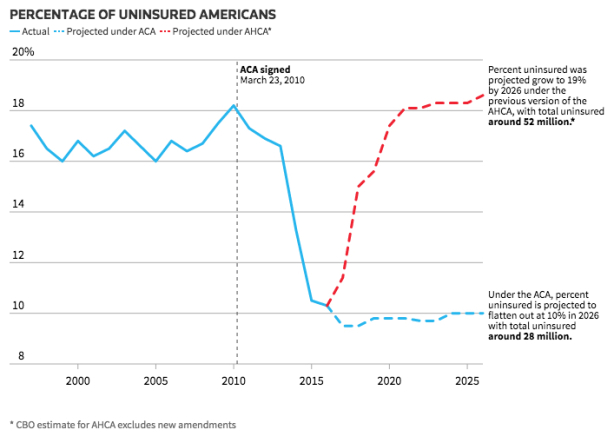From David Ruccio As regular readers of this blog know, I am no fan of the way healthcare is currently organized in the United States. The U.S. healthcare system, as it is currently configured, only really works for those who make a profit—selling health insurance, pharmaceuticals, and in-patient and acute-care services in hospitals—and those who have the wherewithal to finance their own healthcare. But Republican plans to repeal the Affordable Care Act, aka Obamacare, and replace it with the American Health Care Act will move us even further from the goal of providing universal, affordable, high-quality healthcare for the American people. The new act, aka Trumpcare, hasn’t yet been been scored by the Congressional Budget Office. And it will likely change as Senate Republicans get
Topics:
David F. Ruccio considers the following as important: Uncategorized
This could be interesting, too:
tom writes The Ukraine war and Europe’s deepening march of folly
Stavros Mavroudeas writes CfP of Marxist Macroeconomic Modelling workgroup – 18th WAPE Forum, Istanbul August 6-8, 2025
Lars Pålsson Syll writes The pretence-of-knowledge syndrome
Dean Baker writes Crypto and Donald Trump’s strategic baseball card reserve
from David Ruccio
As regular readers of this blog know, I am no fan of the way healthcare is currently organized in the United States.
The U.S. healthcare system, as it is currently configured, only really works for those who make a profit—selling health insurance, pharmaceuticals, and in-patient and acute-care services in hospitals—and those who have the wherewithal to finance their own healthcare.
But Republican plans to repeal the Affordable Care Act, aka Obamacare, and replace it with the American Health Care Act will move us even further from the goal of providing universal, affordable, high-quality healthcare for the American people.
The new act, aka Trumpcare, hasn’t yet been been scored by the Congressional Budget Office. And it will likely change as Senate Republicans get their hands on it.

source [ht: ja]
But the CBO analysis of Trumpcare (before it was amended prior to the House vote) indicated that it would increase the number of people who are uninsured by 24 million in 2026 relative to current law, raising the total number of uninsured Americans to around 52 million!
And, as former head of the CBO Douglas Ellmendorf has said, “What matters is not just how many people have insurance. But whether people who really need insurance have insurance.”
Who else is going to be affected (according to Heather Timmons)?
Well, to start with, the 178 million people who have healthcare insurance through their employers, because employers will be allowed to choose which state’s coverage guidelines they adopt.
Then there are the 52 million people with pre-existing conditions, including women who have had C-sections and people who have allergies.
Plus the 10 million with disabilities, including students in special education programs, who will be severely affected by cuts in Medicaid funding.
And, finally, the 60 million people in their 50s to mid-60s, who will likely face higher insurance costs.

So, yes, the Republican moves to repeal and replace key provisions of Obamacare represent crimes against humanity.
Who’s going to gain from these crimes? The usual suspects: large employers, who will no longer be required to offer affordable coverage to their workers; and wealthy individuals, who will face lower taxes and be allowed to save more money in tax-excluded health savings accounts.
